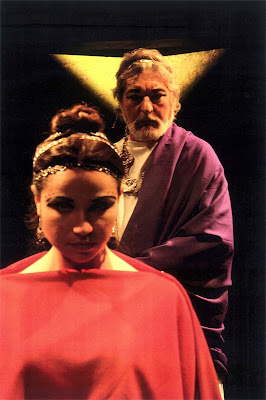The following review was scheduled for my Stage Matters column in the North Coast Journal this week (April 1 issue.) While I was writing it this weekend, I was informed that it wouldn't run--apparently a space issue. When the paper comes out tomorrow, perhaps we'll know why.
Some version of this review will now appear in the Journal in the April 8 issue (I hope.) But given the short run of the play reviewed, I thought I could at least publish the review here, at the time it was supposed to appear.
Live theatre happens in a particular time in the real world. No one associated with the North Coast Repertory Theatre production of
Doubt: A Parable—a 2004 play that concerns allegations of a priest’s sexual misconduct—could have known that it would open as the Catholic Church is facing accusations over its handling of child abuse by clergy---and this time the charges are so serious that some observers suggest it is the gravest crisis the Church hierarchy has faced in modern times.
Some of the cases in the news are from the 1960s, and this play is set in a Bronx parish in 1964. But even though it is pertinent in some respects, it will probably disappoint those looking for complete answers on this issue. As written by John Patrick Shanley, this play has some of the qualities of the topical debate plays that were popular in that era, like
Inherit the Wind or
Twelve Angry Men. But the word “parable” is in the title for a reason. The play concerns such philosophical issues as the nature of knowledge, doubt and certainty, and the turmoil in the human heart.
The Oscar-nominated 2008 movie version (which Shanley wrote and directed) added incidents and characters, as well as the specific atmosphere of the Bronx. This stage version however has only four characters—all adults-- and takes place in just a few locations.
The story pits Sister Aloysius, the stern veteran principal of St. Nicholas grade school, against Father Flynn, a progressive priest who advocates a gentler approach. Sister Aloysius suspects Father Flynn of improper behavior involving an eighth grade boy, who is also the only black child in the school. Sister James, whose observation sparked this suspicion, is a young nun caught in the middle—trying to live up to the senior nun’s standards, but sympathetic to the priest’s apparent openness and enthusiasm. The fourth character is the boy’s mother (Mrs. Muller), who adds more complications. Sister Aloysius makes her accusation, and the consequences comprise the rest of the play.
Since I attended Catholic schools in this era, taught by this same order of nuns (Sisters of Charity), certain details reminded me of what I’d forgotten I knew. The principal’s office at the center of William Nevins’ efficient set had the right photos on the wall—Popes John and Paul (Popes George and Ringo came later—ha ha, Catholic schoolboy humor), but the crucifix seemed way too small. I was unexpectedly scandalized when Sister Aloysius crossed her legs. The nuns in my school would have considered that provocative, almost lewd.
Janet Waddell as Sister Aloysius was convincingly scary but also complicated, and Josh Kelly as Father Flynn conveyed a more youthful spirit, but also a troubled nature. Wanda Stapp effectively portrayed Sister James’ anguish in trying to reconcile the conflicting influence of the two alphas. Though Michelle Renee Kegan has only one scene as Mrs. Muller, she evoked powerful emotion.
Michael Thomas directed with intelligence and intriguing effects, especially in the riveting climactic scene. Sister Aloysius seemed to get hypnotically demonic, emphasized by Katie Pratt’s dramatic lighting. But when I pried my eyes away from her to look at Father Flynn, his anger was just as dark—and seemed just as emphasized by the lighting.
Though most of the play consists of dialogues between two people, it seemed to be more a set of monologues, in which the actors—perhaps intentionally-- didn’t engage each other. They talked past and over each other, and rarely made eye contact.
Catholics in the audience may be more attuned to the issues of religious faith and doubt, and those who remember this era know that it was a time of major transition: in just a few years, such traditions as the Latin Mass would be gone, and that young nun could kick her habit for more contemporary clothes.
But doubt and certainty have political and judicial consequences, and it’s on the central matter of the priest’s guilt or innocence that the play is often a Rorschach test, apparently by Shanley’s design. As a parable, it doesn't seem to have a clear moral. The play both illustrates how dangerous allegations of such crimes can be, and suggests the shadowy machinations of cover-up.
But I think it’s fair to say the play takes no firm position on even the facts of the priest’s behavior, so for some it may feel more like too clever a vagueness rather than a mind-opening ambiguity. Perhaps it works in the territory between the unsettling and the unsatisfying. But for whatever reasons, or from whatever point of view, this is apt to be a haunting 90 minutes of theatre.
But you have to see it to decide.
Doubt: A Parable continues weekends at NCRT until April 17.







